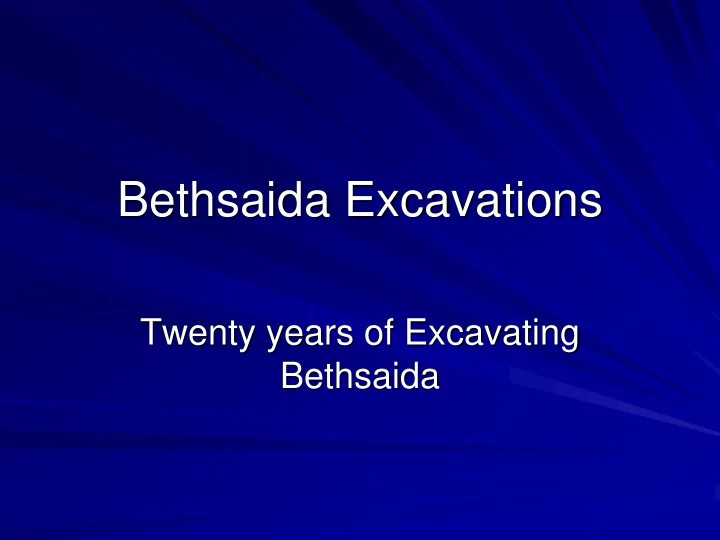

Bethsaida Excavations Twenty years of Excavating Bethsaida
► A forgotten Biblical Kingdom of Geshur ► Bethsaida is located at the North-East of the Sea of Galilee ► It was identified by E. Robinson in 1838 GESHUR ► Since 1987 it is being excavated and since 1991 by BETHSAIDA the Consortium for the Excavations of Bethsaida headed by the University of Nebraska at Omaha. ► Its location, size (20 acres), strength suggests that it was the capital of the Kingdom of Geshur
DAMASCUS TYRE BETHSAIDA SAMARIA RABBAT AMMON JERUSALEM Capital Cities in Southern Levant DIBON
DAMASCUS THE KINGODM OF GESHUR BETHSAIDA
City gate Palace
Upper city Lower City
Stratum 6, mid 10 th to mid 9 th centuries BCE W80 ROOM 3 W84 W400 ROOM 4 ROOM 5 Granary ROOM 2 W87 W85 Palace W86 W318 ROOM 1 W89 ROOM 6 W850 W11 W851 MAIN HALL W88 W325 168.25 W68 W67 ROOM 7 169.40 L365 167.76 169.80 VESTIBULE W83 W301 W12 ENTRANCE ROOM 8 168.80 W315 CITY WALL W320 bedrock L623 W310 L638 W312 cave 167.87 City Gate 167.48 167.13. W325 167.47 167.30 W303 168.27 167.13 169.19 169.61 167.52 167.12 170.26 170.01 167.99 167.08 166.21 167.48 167.38 168.18 167.45 168.53 169.71 DEBRIS DEBRIS W 3 3 5 W 170.65 4 0 5 169.80 171.75 JAR BURIAL W 3 3 7 171.75 170.23 168.95 169.02 B A S T I O N 170.84 170.71 170.9 170.78 W403 172.12 172.51 172.91 170.79 174.15 W855 170.69 170.45 173.96 C C.L.E. 2006
A Section at the Outer City Gate, strata 5, 6
The Façade of the outer city gate
The King of Assyria Shalmaneser III visited Bethsaida twice, in 842 and 838 BCE
C C.L.E. 2006 W67 L365 W11 W12 cave ROOM 5 ROOM 7 W310 ROOM 8 ROOM 6 W85 W84 W86 W68 bedrock L638 ROOM 4 W80 W87 MAIN HALL L623 W312 W325 W89 ROOM 3 W400 VESTIBULE W88 ROOM 2 ROOM 1 W83 W320 Palace W318 ENTRANCE Four chamber city gate Served as granary City gate Storage
Southern Tower Bastion Inner city gate Chamber Chamber 2 1
A Section showing the city walls C C.L.E. 2006
Four Chamber City Gates 600 Bethsaida 500 Dan 400 Megiddo IVA Dor 300 Beer Sheba V Beer Sheba III 200 Ashdod 10 100 Tell En-Nasbeh 0 size in sq.m.
City Wall debris Paved Road Outer City Walls
Inner City Gate reconstructed with wood beams
THE DECORATED STELE AS WAS LEFT AT 732 B.C.E. BASIN NOTICE THESE STONES
The moon-god from Bethsaida
The Stepped High Place
A Direct Access High Place
Sacrificial High Place A pit filled up with Sacrificial left over. All animals were Kosher Animals
Chamber 4 To the name of The Moon God Symbol
The Siege of Bethsaida 732 BCE
A Revival in the Hellenistic Period In the 3 rd BCE Bethsaida was resettled as a colony of Tyrians. The Bethsaida inhabitants provided Tyre with linen garments. They made “good living” and were able to purchase their wine from the Island of Rhodes which was considered to be the best wine in the market.
Hellenistic weaving set from Bethsaida
Gold Earrings – a sign of wealth
Bethsaida in the Hellenistic Period In about 100 BCE Bethsaida was conquered by the Hasmoneans. The town declined.
Bethsaida in the Roman Period Bethsaida was resettled by the Herod as these coins demonstrate. Herod populated Bethsaida with Jews as these fragments of a limestone vessel indicates The site thrived once more
Bethsaida under Philip the son of Herod In 30 CE Bethsaida was elevated to a status of a “Polis” – Greek city This coins was minted by Philip in commemoration of this act. Philip renamed Bethsaida Julias after Augustus’ wife, Livia, Julia
The Temple for Julia/Livia Philip built a temple for the Roman Imperial cult and dedicated it to Julia/Livia
Decorated Stone from the Temple Mount in Jerusalem
Favisa, Sacred Deposits near the Temple
Utensils from the Temple Simpulum Strigilis
A Roman Temple Residential Quarter City wall Cemetery C C.L.E. 2006
Houses next to the city Bethsaida as Jesus saw it wall The “Clinic” Dining room Remnants of a Open courtyard (Triclinium) Private house Kitchen Wine cellar The “Wine Maker” House
The “wine maker’s House”
The “Wine Maker’s House”
Fishing Gear
Limestone Vessels a hallmark of Jewish presence
Private Homes at Bethsaida
A Gem Stone
A group of Roman Nails Left by a Carpenter
Digging west of the gate
A Hellenistic Juglet
A Roman Bronze Bowl (Patera) from the Temple Area
A Decorative Nail from perhaps from the door of the temple
Breakfast
Some of our attentive students
Tension is built up
THANK YOU
Recommend
More recommend